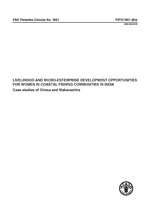|
Tietze, U., Siar, S., Upare, S. M. & Upare, M.A. 2007..
Livelihood and micro-enterprise development opportunities for women in coastal fishing communities in India – Case studies of Orissa and Maharashtra.
FAO Fisheries Circular. No. 1021. Rome, FAO. 2007. 69 p.
ABSTRACT
The studies on livelihood and micro-enterprise development opportunities for women in coastal
fishing communities in India are a follow-up to the national workshop on best practices in
microfinance programmes for women in coastal fishing communities in India, held in Panaji, Goa,
India, from 1 to 4 July 2003. The proceedings and outcomes of the workshop are reported in FAO
Fisheries Report No. 724.
The studies found that poverty has remained a serious problem in fishing communities in Orissa and
Maharashtra, made even more severe by the widespread absence of rural infrastructure and services
such as safe drinking water, electricity, waste and sewage disposal facilities, health care and
educational services and facilities, all-weather link roads as well as a lack of adequate housing
facilities. Over the last two decades, fishing effort and the cost of fishing have considerably increased. Over the same period, a diversification of livelihoods of fisherfolk households has taken place, and many household members, particularly women, are now working part-time as unskilled agricultural labourers or construction workers.
In recent years, through the efforts of non-governmental organizations (NGOs), the marine wing of
the Fisheries Department of Orissa and the initiative of other government departments, many women
self-help groups (SHGs) and cooperatives have been formed and training has been provided to their
members in the field of fish processing and marketing. Only a minority of the SHGs and cooperatives
in Maharashtra and Orissa though, which have been formed in fishing communities, have so far been
linked to financial institutions and there is a severe lack of rural fish storage and processing
infrastructure and facilities.
The findings of the studies suggest that through actively promoting self-help groups and cooperatives
among women in coastal fishing communities and through linking these associations with financial
institutions, investment and working capital needs of their members can be met. To make the best use
of capital inputs, SHGs and their federations need vocational and enterprise development training
from NGOs and from fisheries training and research institutions as well as assistance for establishing
links to new market outlets for their products, both domestically and for export. The state-level
workshops in Orissa and Maharashtra made specific recommendations as to what kind of assistance is
needed so that poverty in coastal fishing communities can be reduced and livelihoods improved and
diversified through micro-enterprise development and microfinance and training support.
|
